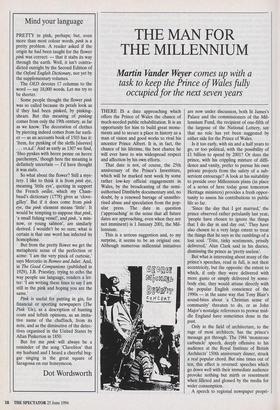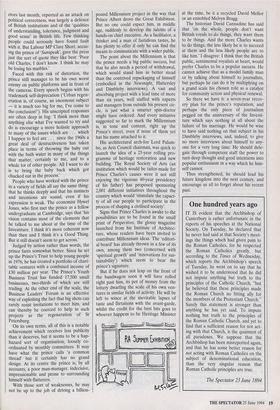THE MAN FOR THE MILLENNIUM
Martin Vander Weyer comes up with a
task to keep the Prince of Wales fully occupied for the next seven years
THERE IS a date approaching which offers the Prince of Wales the chance of much-needed public rehabilitation. It is an opportunity for him to build great monu- ments and to secure a place in history as a man of vision and good works to rival his ancestor Prince Albert. It is, in fact, the chance of his lifetime, the best chance he will ever have to win widespread respect and affection by his own efforts.
That date is not, of course, the 25th anniversary of the Prince's Investiture, which will be marked next week by some rather low-key official engagements in Wales, by the broadcasting of the semi- authorised Dimbleby documentary and, no doubt, by a renewed barrage of unautho- rised abuse and speculation from the pop- ular press. The date in question (`approaching' in the sense that all future dates are approaching, even when they are not imminent) is 1. January 2001, the Mil- lennium.
This is a serious suggestion and, to my surprise, it seems to be an original one. Although numerous millennial initiatives are now under discussion, both St James's Palace and the commissioners of the Mil- lennium Fund, the recipient of one-fifth of the largesse of the National Lottery, say that no role has yet been suggested by either side for the Prince of Wales.
Is it too early, with six and a half years to go, or too political, with the possibility of £1 billion to spend by 2001? Or does the prince, with his crippling mixture of diffi- dence and vanity, prefer to pursue his own private projects from the safety of a sub- servient entourage? A look at his suitability to preside over Millennium plans (in place of a series of here today gone tomorrow Heritage ministers) provides a fresh oppor- tunity to assess his contributions to public life so far.
`Since the day that I got married,' the prince observed rather petulantly last year, `people have chosen to ignore the things that I do day in and day out.' They have also chosen to a very large extent to treat the things that he says as the ramblings of a lost soul. 'Trite, tinky sentiments, prissily delivered,' Alan Clark said in his diaries, dismissing the prince as 'pretty useless'.
But what is interesting about many of the prince's speeches, read in full, is not their eccentricity, but the opposite: the extent to which, if only they were delivered with more gusto or simply delivered by some- body else, they would attune directly with the popular English conscience of the 1990s — in the same way that Tony Blair's sound-bites about 'a Christian sense of community' threaten to do, or as John Major's nostalgic references to prewar mid- dle England have sometimes done in the past.
Only in the field of architecture, to the rage of most architects, has the prince's message got through. The 1984 'monstrous carbuncle' speech, deeply offensive to his audience at the Royal Institute of British Architects' 150th anniversary dinner, struck a real popular chord. But nine times out of ten, this effect is reversed: speeches which go down well with their immediate audience provoke nothing but mirth or resentment when filleted and glossed by the media for wider consumption.
A speech to regional newspaper propri- etors last month, reported as an attack on political correctness, was largely a defence of British institutions and of the 'qualities of understanding, tolerance, judgment and good sense' in British life. Few thinking people could seriously have found fault with it. But Labour MP Care Short, accus- ing the prince of `Sunspeak', gave the press just the sort of quote they like best: 'Poor old Charles, I don't know. I think he may be losing his marbles.' Faced with this risk of distortion, the prince still manages to be his own worst enemy on public platforms and in front of the cameras. Every speech begins with his trademark self-deprecation (`Urban regen- eration is, of course, an enormous subject — it is much too big for me, I've come to the conclusion!). His unscripted responses are often deep in fog: 'I think more than anything else what I've wanted to try and do is encourage a more holistic approach to many of the issues which are . . which I happen to feel are . . since the 1960s a great deal of destructiveness has taken place in terms of throwing the baby out with the bath water in many of the things that matter, certainly to me, and to a whole lot of other people. All I want to do is to bring the baby back which got chucked out in the process.' People who have worked with the prince in a variety of fields all say the same thing: that he thinks deeply and that his instincts and intentions are sound, even if his expression is weak. The economist Hywel Jones, who first met the prince as a fellow undergraduate at Cambridge, says that 'his vision contains most of the elements that he talked to me about at the time of the Investiture. I think it's more coherent now than then and I think it's a Good Thing. But it still doesn't seem to get across.'
Judged by action rather than words, the prince fares somewhat better. Since he set up the Prince's Trust to help young people in 1976, he has created a portfolio of chari- table ventures with a combined income of £30 million per year. The Prince's Youth Business Trust has funded 17,500 small businesses, two-thirds of which are still trading. At the other end of the scale, the Business Leaders' Forum is an effective way of exploiting the fact that big shots can rarely resist invitations to meet him, and can thereby be coerced to help in such projects as the regeneration of St Petersburg.
On its own terms, all of this is a notable achievement which receives less publicity than it deserves, but it seems to be a hap- hazard sort of organisation, loosely co- ordinated by monthly committees. It may have what the prince calls 'a common thread' but it certainly has no grand design. At its centre the prince is, by all accounts, a poor man-manager, indecisive, impressionable and prone to surrounding himself with flatterers.
With those sort of weaknesses, he may not be up to the job of driving a billion-
pound Millennium project in the way that Prince Albert drove the Great Exhibition. But no one could expect him, in middle age, suddenly to develop the talents of a hands-on chief executive. As a facilitator, a thinker and a man of fastidious tastes, he has plenty to offer if only he can find the means to communicate with a wider public.
The point about the Millennium is that the prince needs a big public success, but that he also needs a period of withdrawal, which would stand him in better stead than the contrived repackaging of himself (embodied in the Newsnight, Hattersley and Dimbleby interviews). A vast and absorbing project with a lead time of more than six years, well staffed with experts and managers from outside his present cir- cle, is just what a smarter spin-doctor might have ordered. And every initiative suggested so far to mark the Millennium is, in tone and content, right up the Prince's street, even if none of them yet has his name attached to it.
His architectural arch-foe Lord Palum- bo, as Arts Council chairman, was quick to launch the idea of a 25-year rolling pro- gramme of heritage restoration and new building. The Royal Society of Arts (an institution which would be tailor-made for Prince Charles's causes were it not still enjoying the vigorous 40-year presidency of his father) has proposed sponsoring 2,001 different initiatives throughout the country which would 'stimulate the capaci- ty of all our people to participate in the process of shaping a civilised society'.
Signs that Prince Charles is awake to the possibilities are to be found in the small print of Perspectives, the glossy magazine launched from his Institute of Architec- ture, whose readers have been invited to contribute Millennium ideas. The 'editori- al board' has already thrown in a few of its own, among them two (concerned with `spiritual growth' and 'innovations for sus- tainability') which seem to bear the prince's signature.
But if he does not leap on the front of the bandwagon soon it will have rolled right past him, its pot of money from the lottery dwarfing the scale of his own ven- tures in similar fields of activity. He will be left to wince at the inevitable lapses of taste and flirtations with the avant-garde, whilst the credit for the best bits goes to whoever happens to be Heritage Minister at the time, be it a recycled David Mellor or an ennobled Melvyn Bragg.
The historian David Cannadine has said that 'on the whole, people don't want British royals to do things, they want them to be things. And the more Charles wants to do things, the less likely he is to succeed at them and the less likely people are to like him.' I disagree: I think that the British public, sentimental royalists at heart, would prefer Charles to be a popular success. He cannot achieve that as a model family man or by talking about himself to journalists, but perhaps he can do it by multiplying on a grand scale his chosen role as a catalyst for community action and physical renewal.
So there we have it: a seven-year recov- ery plan for the prince's reputation, and perhaps the only piece of journalism pegged on the anniversary of the Investi- ture which says nothing at all about the failure of his marriage. He would be wise to have said nothing on that subject in his Dimbleby interviews, and, indeed, to give no more interviews about himself to any- one for a very long time. He should dele- gate through competent staff the power to turn deep thought and good intentions into popular enthusiasm in a way which he him- self cannot.
Thus strengthened, he should lead his future kingdom into the next century, and encourage us all to forget about his recent past.

































































 Previous page
Previous page